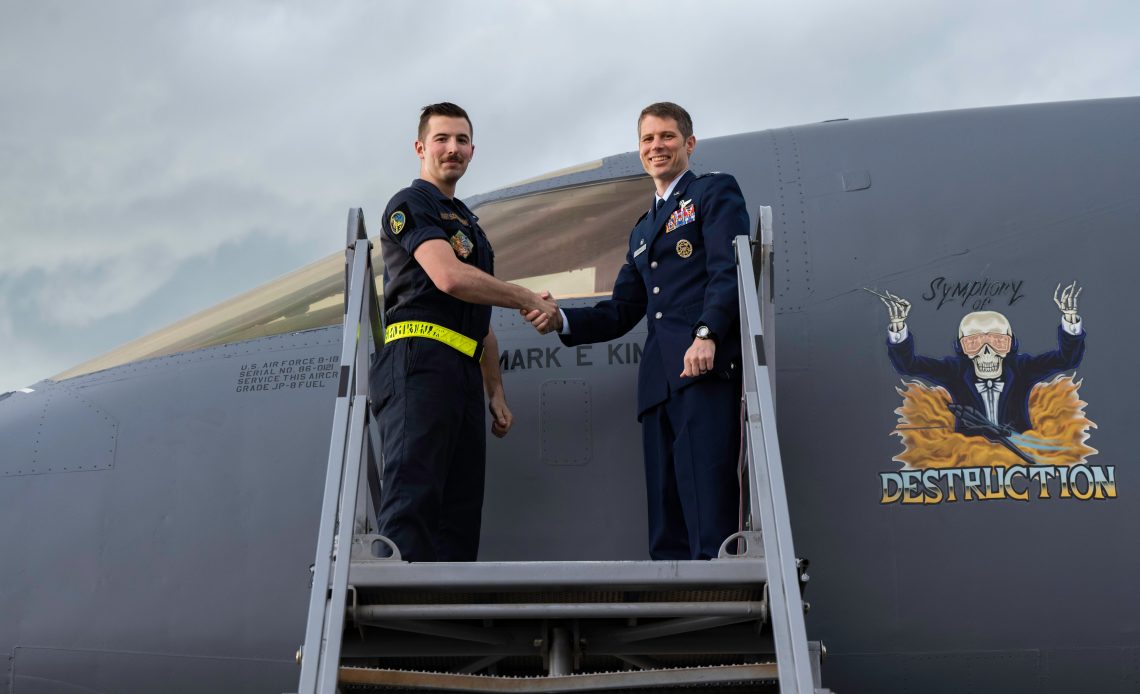
The Air Force has fired an operations group commander at Ellsworth Air Force Base in South Dakota, following the release of a scathing report into a B-1B Lancer bomber’s January crash.
Col. Mark Kimball, commander of the 28th Operations Group, was removed “due to a loss of trust and confidence in his ability to command,” Air Force Global Strike Command said Friday. Kimball was relieved by 28th Bomb Wing commander Col. Derek Oakley based on the findings of the accident investigation board report on the Jan. 4 B-1 crash.
That report, which Global Strike released July 25, blasted “an organizational culture that tolerated decaying airmanship skills” as one of the factors that led to the loss of the $451 million bomber.
“Many failures leading to this mishap were not a one-time occurrence or an aberration,” the report said. “The mishap occurred due to numerous factors, including a culture of noncompliance, widespread deviation from established policy and procedure, and several organizational influences and preconditions.”
Global Strike spokesman Charles Hoffman told Air Force Times that the 28th Operations Group is now under temporary leadership, but a permanent replacement for Kimball has not yet been chosen.
The B-1 that crashed was one of two flying a routine training mission Jan. 4. The weather started off calm that afternoon but worsened as the flight progressed, the report said. Dense fog rolled in across the airfield and limited the pilots’ visibility, and as the B-1 made its landing approach, the winds rapidly shifted.
Investigators found the pilot did not make the necessary throttle adjustments to keep the plane’s airspeed up as wind conditions changed. The bomber started to lose altitude and by the time the pilot hit the afterburners to try to climb, the report said the B-1 was “unrecoverable and out of control.”
:quality(70)/cloudfront-us-east-1.images.arcpublishing.com/archetype/VW5SVX6HBZAU7IMEFAVI3DO2OQ.png)
The bomber hit the ground and the crew of four ejected; two were treated and released from a medical facility for injuries they sustained in the ejection. The B-1 skidded about 5,000 feet across the runway and burst into flames. It was a total loss.
Investigators found that poor weather conditions, including icing, and a lack of awareness of airfield conditions substantially contributed to the crash.
However, the culture of units within the 28th Operations Group and their levels of airmanship drew the harshest comments from investigators.
The report concluded that the bomber’s crash was mainly caused by the crew’s failure to carry out an effective “composite crosscheck,” in which they consult multiple instruments to keep track of how the aircraft is flying. If this had been done effectively, the report said, the crew should have been able to tell the bomber was losing speed, even in a low-visibility environment.
The report said the bomber’s crew “succumbed to complacency and fixation” and criticized the instructor pilot on board for being “ineffective in his crew leadership and instructor supervision duties.”
The report also criticized the 28th Operations Support Squadron for allegedly failing to communicate airfield and weather conditions, which investigators said also reflected “culture and leadership issues” in the unit.
Hoffman said other airmen received administrative and corrective actions, including a variety of disciplinary letters. Some actions were taken within a month of the crash, after the initial investigation, Hoffman said. He was unaware of any demotions resulting from the report.
Hoffman said Gen. Thomas Bussiere, head of Air Force Global Strike Command, and other commanders “have taken what was written in that scathing report to heart” and are taking steps to ensure those mistakes don’t happen again.
Author: Stephen Losey
Source: DefenseNews



